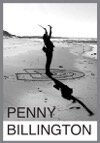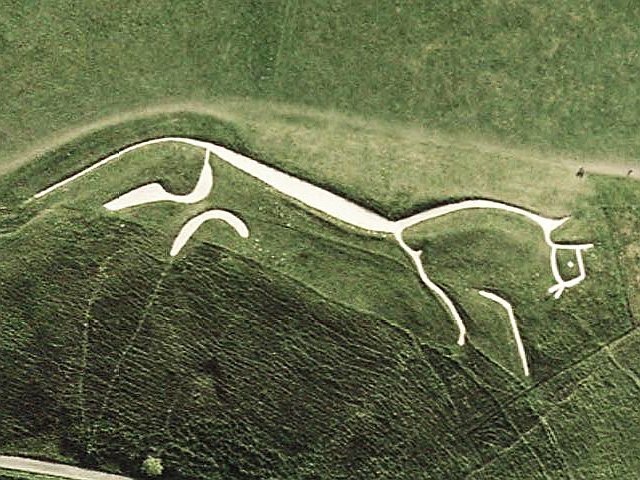Spend the summer in blinkers? Nay/neigh!
Hail, at the season of high summer, to the horse: great solar totem of our islands. The British Isles have more chalk figures than anywhere else in Europe, and horses – by virtue of the chalk, always white horses – are firm favourites.
By a midsummer campfire this year I spoke to a chap involved in re-cutting the white horse of Uffington back to its pre-war dimensions: the poor animal has been becoming thinner and as it was already as wasp-waisted as a whippet, remedial work was certainly needed.
It’s good to ponder the majesty of the horse at this time.
Just the thought of carved white horses galloping over green hills from ancestral times to our own takes us into enchantment. It evokes the energy and power of the sun shining on the land from a clear sky in summer. And horses are as generous and great-hearted as the sun: we love and revere them for their affection and willingness to serve humanity. To think of these noble, beautiful beasts is to access a vital flow from one’s own heart that can spin out into the world.
Although commonly eaten in many EU countries, eating horse flesh is anathema to the British. Now, as I am ever one for a theory, I wonder if the deep bond the Celts had with their horses has found a resonance in the land, that still influences us today? We might even have stored a body memory of it, for certainly in those times there were prohibitions on eating totem animals.
From Wales, we have a mare-and-foal tale whose origins may also lie in those times - Rhiannon and her son Pryderi. Rhiannon rode into the human world in a gold gown; on a white horse and cirumambulating the magical mound as a planet does the Earth. She came from the deep world of Annwn to claim her love and destiny. Her story exemplifies grace and strength in adversity and she reverted to her totem horse aspect when she was calumniated. Her son Pryderi was stolen at the same time as a foal: their watchers had been lulled into a magical sleep on Calan Mai, May Eve. After years, he rode the horse back to Pwyll’s court to be restored to his mother.
More widespread than this tale are the carvings all over Europe of the horse goddess Epona, beloved by the Romans soldiery.
Below: Epona from Courtney Davis; ‘The art of Celtia’. A huge picture - but who am I to try to reduce it? Enjoy!
Now everything so far evokes freedom, speed, ancientry, autonomy and choice… so what’s with the blinkers? Bear with me.
It started with today’s irritating weather forecast –I realised that we are shown the world in such a focused way that we are virtually in blinkers, and this is because the media is in love with statistics. Every area of news does this focusing on the minutiae to the exclusion of the wider context. In the case of the weather, every day, every season, every year seems mooted as the hottest/wettest/driest/coldest, “since records began”. Leaving aside the vitally important issue of temperature/climate change, our response to these statistics might be, “So what?”
Determining a day’s exact place in a statistical format is totally irrelevant to how we experience the weather. And that is not rocket science. We can confidently predict that, after weeks of rain, we will probably find more of it depressing. Ditto high temperatures. Eventually we’ll be worried about flooding or drought. But we’re not helped by pseudo-scientific comparisons; how we feel is our lived experience, and no statistic will make any difference. The world is nuanced, and so are all our actions, and when we look out to check the weather, a million other personal impulses will all contribute to our unique response to it. And that response is what we call our reality. Not a blinkered, focused response, but an holistic embracing of each day.
But horses, ambling or racing, often do wear blinkers, for these reasons:
To help them focus
To stop them being distracted by what’s around
To stop them being discouraged by others and giving up – or not even starting
We can see how brilliantly we can apply this to ourselves. Being distracted by what is around - and especially seeing others appear to do things effortlessly - is enough to discourage us so our attempts are half-hearted, we give up half way or don’t even try. Procrastination! We all know it and facetiously, may joke, ‘I like work; it fascinates me. I can sit and look at it for hours.’ But in our heart of hearts, we know the reality: ‘Nothing is so fatiguing as the eternal hanging on of an uncompleted task.’ Thanks to philosopher William James for this one: it’s not snappy, but that frowning feeling of tiredness behind the eyes as we look at a to-do list is evidence of its truth.
So the trick is when to stop galloping and absorbing the wonders of the wider world, and when to get the blinkers on and focus, disregarding distractions or the achievements of others.
We might do it to get a job or project done, but not necessarily. Equally valuable is time to focus on being present, or developing an attitude of peace, patience or loving awareness…. We need our ‘slow’ blinkers for these – removing ourselves from our frenetic world and getting into ‘nature time’.
With learning new skills (resolutely ignoring the fact that someone will always be more talented or proficient than us) we can help ourselves by paring down huge swathes of content to bite-size pieces, to give us easily achievable aims. And Richard Carson, author of ‘Don’t Sweat The Small Stuff’, has some excellent advice for us: “You can start with as little as five minutes and build up your capacity for patience, over time. Start by saying to yourself, “Okay, for the next five minutes I won’t allow myself to be bothered by anything. I’ll be patient.” What you’ll discover is truly amazing. Your intention to be patient, especially if you know it’s only for a short while, immediately strengthens your capacity for patience.”
(Thanks to David at Raptitude for this excellent quote: find his blog here. )
Summer is an especial challenge to many of us: the distractions of the weather, the natural world, and the zeitgeist, which says ‘Time to holiday, people! barbecue! Party! Relax!’ – and we should embrace that as our reality, not fight against it.
But this ‘five minutes’ might be the key to keeping a handle on other aspects of life.
Just five minutes’ focus 20 times a day is only just over 1.5 hours. Think of looking back at 20 small achievements, every single day – and then, after subtracting sleep-time, knowing that we’re still left with over 15 hrs for just being in summer, spring, autumn, or winter, whichever it is in your part of the world.
Imagine…
Freeing all those hours from guilt, to enjoy and absorb fully the glorious wider context of ourselves in nature. Imagine no statistical blinkers to intrude on our reality - whether the cosiness of a fire, the green witchery of the forest scents, the salt-sticky-ozone-zephyr that is the seashore breeze, a magical path through the fields...
Blinkers are useful: they can calm us down and realign our focus, so we can run our best race. Let’s don them frequently, knowing that we can discard them the moment the job is finished.
And for the rest of the time? Gallop across the hills! Let’s fill our lungs with sweet fresh air, perfumed with the ripening crops, as our hoofs bruise the greensward. Let’s feel, regardless of actual age or mobility problems, the rippling of strong muscles in perfect co-ordination and the golden sun in our heart-space, glowing and expansive, making all things seem possible. Let’s gallop from dawn, through the day, into the summer sunsets and so into the world of gentle, restorative sleep.
The horse is a potent mythic totem, and its freedom is only one imaginal step away, so let’s revel in using our magical imaginations. Happy Sun, Moon and Stars to us all.
The wonderful Trondholm sun chariot: Museum of Denmark





